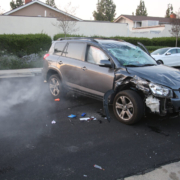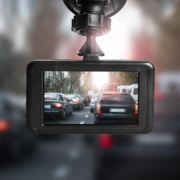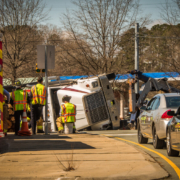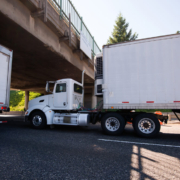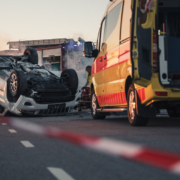A Closer Look at PTSD After Surviving a Truck Accident
When people think about post-traumatic stress disorder (PTSD), they tend to think about the military. However, the vast majority of PTSD patients have never served in the military—and a traumatizing experience that puts you in fear for your life or someone else’s life has the potential to change your brain in radical and irreversible ways. Those who are involved in truck accidents know immediately that their lives are in danger; although truck accidents are relatively rare, they are far more likely to be fatal than other types of collisions. Because of this, a significant number of victims develop PTSD in the aftermath.
It’s crucial to support victims as they recover from the trauma caused by a truck collision in Charleston. Looking for more personalized legal assistance with your claim? Call Bailey Javins & Carter at 800-497-0234 to set up a consultation now.
Symptoms of PTSD in Survivors
Accident victims may not realize that they’re at risk for PTSD, so it’s especially important that loved ones and medical providers be on the lookout for symptoms. The earlier PTSD is identified and treated, the better chance a victim has of recovering. Common symptoms of PTSD include:
- Re-experiencing symptoms including flashbacks, recurring memories and nightmares, distressing thoughts, and physical signs of stress
- Avoidance symptoms including staying away from things that remind you of the accident and intentionally not thinking about the event
- Reactivity symptoms, including being easily startled, difficulty concentrating, irritability, aggression, being tense and on edge, or participating in dangerous behavior
- Cognitive and mood symptoms including difficulty remembering the event, negative thoughts, feelings of blame directed at yourself or others, loss of enjoyment of activities, social isolation, and difficulty experiencing positive emotions
Simply having these symptoms doesn’t mean someone has PTSD. It is common for many of these symptoms to pop up in the aftermath of an accident. For these symptoms to point to PTSD, someone must experience them for at least a month and experience them in such a way that it interferes with their daily life.
How PTSD Affects Daily Life and Overall Functioning
PTSD can negatively impact every aspect of your daily life. Getting back to work and family life is a challenge when you never know when a memory of the event will set you off or throw you into a flashback. The cognitive and emotional side of PTSD can make it hard to maintain relationships, seek help from those close to you, or get your negative feelings out into the open. Without help and treatment, these symptoms often worsen over time. They may result in more outbursts, putting your job and social life in danger. Depression and anxiety often happen alongside PTSD, presenting further obstacles to your recovery.
The Importance of Prompt Treatment
Mental health professionals are an excellent source of support for those suffering from PTSD. While all counselors will have some education and training in PTSD, working with a professional who specializes in trauma disorders may speed up your progress. Many mental health professionals recommend a two-pronged approach to treatment: seeing a psychiatrist to help with medication and seeing a therapist to work through coping skills and negative thought patterns.
Coping and Recovery
While working through treatment with mental health professionals, PTSD patients should also rely on friends and family members for support. People know how traumatic a truck accident can be, and they likely want to help. Find out who you can call when you have a PTSD nightmare or when flashbacks force you to take an unexpected day off. Talk to loved ones about getting help with daily tasks and chores that have been made difficult by your mental health struggles. While it can be challenging to ask for help, doing so can speed up your recovery process.
Discuss Your Truck Accident Claim with Bailey Javins & Carter
If your Charleston truck accident was caused by another party, you should not be on the hook for your own medical expenses, lost wages, and other accident-related losses. Let us help. Call our team at 800-497-0234 or fill out our online contact form to set up a free consultation with our team of attorneys.


